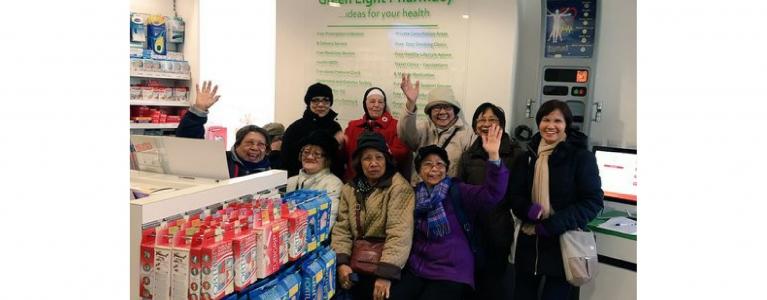
For Creative Health and Wellbeing week, we look at some great initiatives happening across London.
Creative health examines the effects of creativity on health, including how creativity, the arts, heritage, connection to nature and connection with others spark alterations to a person’s or a community’s neurological, biological, psychological and/or social health. Researcher and academic Tamsin Youngson explored various models used to deliver this in London. As part of her dissertation for an MASc Creative Health at UCL, she visited projects on the ground and shared her findings with us.
Back in the early 2000’s , Green Light Pharmacy in Euston secured funding from the Big Lottery Fund to facilitate a series of walks for clients it knew from its own patient base, as well as those referred by local charities whom the pharmacy worked closely with. Funding for the walks was always precarious but in 2016 all external funding ceased. Since then the pharmacy funded the walks itself; this was challenging, as NHSE cut pharmacy funding by 30%. Because of the social importance to the walk’s participants, the pharmacy felt the need to fund the walk directly to ensure they continued. Tamsin took part in and observed one of the walks last summer. The creative and nature based activities provided by the pharmacy simultaneously offer routine and variety, as well as perception of improved health and socialisation.
“Green Light Pharmacy opened the doors to its first pharmacy in 1999, in the densely populated, diverse community of Euston, London. The intent of Green Light’s founding pharmacist was ambitious but determined: to change the then predominant pharmacy model of practice from its narrow focus of traditional supply of prescriptions and retailing to a model that puts community at its core and wellness, education and prevention as the focus. Green Light’s founding principles were: to have a clinical and patient centred focus to its healthcare provision; to set up the first employee owned pharmacy in the UK (so ALL employees literally owned the organisation); and to give back to the communities where its pharmacies are located. Although there wasn’t a term for this approach back in 1999, perhaps the modern phrase “Corporate Social Responsibility” (CSR) best describes this approach.
We are dedicated to creating resilient communities with a focus on health, wellbeing and creation of social capital. We hope, together with those communities we serve, to build a better tomorrow.” Green Light Pharmacies
The walks initially started out of the tragedy of several of the pharmacy’s elderly patients all becoming widowers at a similar time. The pharmacy was aware of the statistic of women outliving men, but also data showing how the social networks of these widows often subsequently shrank, impacting on their mental and physical health. The walks were born from the pharmacy wanting to help these women establish new support networks, and thus introduced the women to each other, trained one of its staff as a walk leader and took the group for walks around nearby Regent’s Park. Twenty years later the walks are still going and thriving, and most importantly helping to establish new friendships and support networks, as well as providing regular exercise for the participants.
The walks offer a safe space for people from different backgrounds to socialise and be together in nature. As numbers of participants swelled, the walks expanded to three groups, each meeting weekly.
“One participant grabbed me by the arm and beelined for a bushy dark-green plant. They tore off a leaf, gave it to me and continued to walk excited, explaining: ‘This leaf is from a plant that my mum used to cook with in China. Rub it, smell it.’ I took a nibble. It was like a mild and bitter sage” writes Tamsin.
Tamsin found that the project demonstrates that creative health presents the opportunity for participants to be their unique selves without the suppression of their individuality.
Some systemic complexities and issues were raised through Tamsin’s research, which can be useful to note for improvement of social prescribing provision in London. Tamsin highlighted:
- Continuity of funding
Green Light pharmacy collaborates with small, local charities and mutual aid groups as part of the West Euston Partnership, which leverages funding. After 10 years of funding from the Big Lottery Fund, regular funding sources for the walks paused and became sporadic and unpredictable, finally ceasing in 2016. Tamsin found that pharmacy staff wish to engage further with social prescribing but have struggled to access consistent funding. The impact of significant NHS pharmacy funding cuts, as well as their already heavy NHS workload has made additional participation in social prescribing projects challenging. - Complexity of ICS structures (Integrated Care Systems)
It seems clarification is required regarding the structure of the ICSs for them to function efficiently. It was pointed out that the word ‘integrated’ is somewhat ironic due to many healthcare workers historic perception of the wider health services in the geography of the ICS being isolated (or ‘siloed’) from one another; although they hope the new ICS will enable genuine integration. - On-the-ground staff play a key role
Staff view pharmacies as the ‘largest NHS walk-in service in the country’. This mindset combined with focusing on their local community allows the Euston branch of Green Light Pharmacy to support people missed by other parts of the health system, for instance by identifying transient people (e.g. migrants, students, tourists and homeless people). For the walks and other socially prescribed activities, having ‘flexible’ instructors who are ‘understanding about ages and abilities’ was one reason participants returned to activities time and time again.
The Mayor's Health Inequalities Strategy sets out his plans to tackle unfair differences in health to make London a healthier, fairer city. The Healthy Communities aim in the strategy – London’s diverse communities are healthy and thriving – commits to social prescribing becoming a routine part of community support across London.